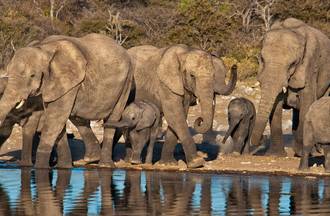Environmental Crime in a Warming World
This programme investigates the evolving impact of global warming on the criminogenic dynamics behind large-scale environmental crime.
Environmental crime dynamics stand to be significantly affected by climate change, yet most global research and practical action focusses on the current dynamics of criminal activity endangering species worldwide. As living resources adapt and relocate in a warming world, illegal actors will respond, profiting from new wildlife, fish and plant distributions. There is thus a critical need to focus on the interplay between climate change and environmental crime.
Our multidisciplinary programme assesses the impact of a warming climate on current patterns of transnational environmental crime – from wildlife trafficking to illegal fishing and deforestation
Programme team
Cathy Haenlein
Director of Organised Crime and Policing Studies
Organised Crime and Policing
Lauren Young
Former Research Fellow
Mark Williams
Programme Manager | SHOC Network Member - Researcher
Organised Crime and Policing
Elijah Glantz
Research Fellow
Organised Crime and Policing
Alexandria Reid
RUSI Associate Fellow, OCP | SHOC Network Member - Researcher
Aims and objectives
This cutting-edge, futures-oriented research programme will comprise a series of separate research initiatives, focused on illegal fishing, wildlife trafficking and illegal logging.
Projects
The first project in this series will focus on large-scale illegal fishing and the impact of oceanic warming on the criminogenic dynamics underpinning this destructive crime.
This project represents the first in-depth study to anticipate the implications of rising oceanic temperatures for the future of large-scale illegal fishing and associated security threats. The goal is to adopt an innovative, futures-oriented lens to assess the interlinkages between illegal fishing, organised crime and climate change, and how these will evolve.
The project explores the following questions:
- To what extent will climate change determine the future direction of the illegal fishing threat worldwide, and the crimes with which it converges?
- How will changes to human–wildlife interaction and land-based security shifts brought about by climate change impact livelihood-related drivers of illegal fishing?
- How will climate change impact the effectiveness of existing legislative frameworks, international agreements and enforcement models designed to monitor and disrupt large-scale illegal fishing?













